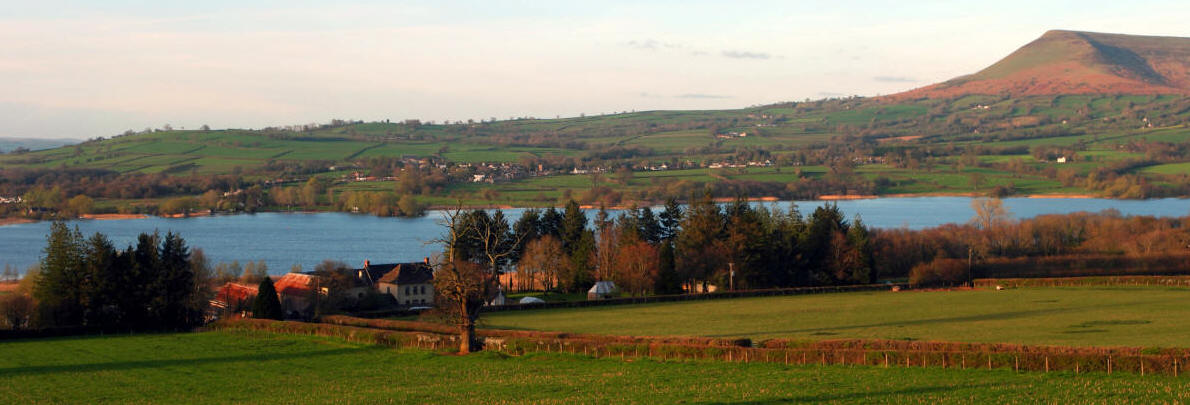Tymawr House
A map was drawn up in 1584 (see below) as part of the court inquiry over the dispute, which are the first documents relating explicitly to the house The witnesses interviewed included one gentleman who remembers being a servant in the house under Hugh Powells father about 50 years before. This suggests that the house had been there in 1534.The house passed from the Powells to the Williams’ through marriage in 1623.The house was an important building on the lake, home to the Lord of the manor of Llangasty Talyllyn. lt was the location of court hearings for the parish, where local disputes were heard and settled. Court rolls survive from courts of Hugh Powell in the 1580s, and later under Edward Williams in the mid 17"“ Century.
Joshua Parry became lord of the manor through his marriage to Rachel Williams, Edward Williams' sister. He chaired the courts at Llangasty Talyllyn, his last was in 1714. He was the great-great-grand nephew of Blanche Parry. A wine-bottle seal with his name on it was unearthed during archaeological investigations on the site during the late 1990s. He died in 1729. The Davies family were from Cwrt Y Gollen. They had amassed a considerable estate by the time Richard Davies became proprietor of Talyllyn House, and upon its sale the estate covered 2000+ acres. According to a sale notice from 1794, and adverts in the Hereford Times from 1792, the house was undergoing some building work, in the form of an extension.
The De Crespigny family were active socialites among upper-class circles. Philip purchased the house as part of a larger estate including the manors of Llangasg, Talyllyn and Blaenllynfi in 1794. He and his son Charles were occasionally High Sheriff of Brecon between 1794-1812. The existing buildings at Talyllyn House were probabty built, or at least modified or finalised, during de Crespigny’s ownership.
From 1800 Philip de Crespigny started to lease the building to tenants such as William Perrott (from 1810), and this marked its long history as a farm house. The diminished importance of the house was probably due to it now being part of a much larger collection of estates accumulated by de Crespigny and Davies.
The house was sold in 1838 to James Holford, head of the Buckland Estate. At this point Talyllyn House becomes known as Ty Mawr or “Great House”. it continued to be leased as a farm house to the Perrott family. Census records from 1861 show that by this point the tenancy had passed on to William Jones and his family. Maps showing the house were produced in 1840 and 1887. The first church tithe schedules, show a very different structural plan to that of the buildings. The second, an Ordnance Survey map, show the structures to be in plan to as they stand today. lt seems that the old “Manor House‘ was before 1887.
The present owners bought the house in 1993 as a family home and restoration project. Since 1995 they have developed a successful business making lime-based plasters and mortars. Their own keenness to stress the heritage and history of the site has led to the initiation of an archaeological excavation on the site of the old manor house, and an associated educational project offering local school groups the opportunity to experience a dig first-hand. The family stll live on the site and the production facility and training centre for the business are situated on site which also has a campsite, kitchen garden shop and cafe.
| Ty Mawr
Timeline |
|
| 1090's | The Normans Reginald Walbeoffe |
| 1500's | Powell family |
| 1534 | Hugh Powell |
| 1580's | Thomas Powell |
| 1623 | Margaret Powell married Thomas Williams |
| William Williams |
|
| 1644 | Edward Williams brother of |
| 1669 | Rachel Williams married Joshua Parry |
| 1695 | Joshua Parry |
| 1729 | James Parry |
| Mary Parry married Richard Davies |
|
| 1745 | Richard Davies sold house to Philip de Crespigny |
| 1794 | Philip Champion de Crespigny |
| 1803 | Charles Fox Champion de Cresprgny |
| 1810 | Wlliam Perrott (tenant) |
| 1838 |
James Price Gwynne |
| 1840 | Perrolt family (tenants) |
| 1861 | William Jones (tenant) |
| 1887 | |
| 1920 | Jones family |
| 1990 | Brecon Beacons National Park |
| 1993 | Nigel Gervis and Joyce Morgan-Gervls and |
